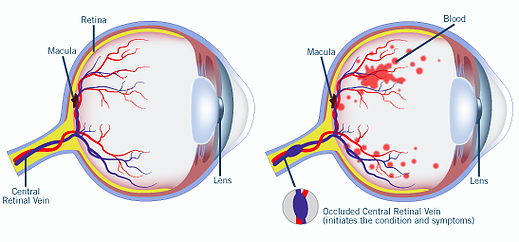Heart disease and ocular health share important common ground.
Ocular manifestations are an important component of heart disease. Heart disease is the No. 1 killer of women in this country. Patients and their Optometrist should understand the importance of cardiovascular health, especially the ocular implications.
The eye really can be the first manifestation of systemic disease, whether it be cardiovascular disease, hypertension other systemic diseases. The eye is not separated from the rest of the body and the eye is unique in that it is one of the only areas where we can actually directly visualize blood vessels.
These fragile vessels, especially those in the highly vascularized retina, can easily become damaged from hypertension, or fall prey to vein occlusions or age-related macular degeneration – all overlapping with cardiovascular complications.
Studies have shown that women are more likely than men to show arteriolar narrowing with an increased risk for secondary ocular vascular complication and possible vision loss. Theoretically, this is due to a more prominent microvascular role in the development of coronary heart disease in women than men, and those with the narrowest retinal vasculature would have twice the risk.
These changes, as well as early signs of hypertension, can be seen by ophthalmologists and optometrists when examining the retina, giving them a role in the diagnosis and management of cardiovascular disease.
This is one of the reasons we take a blood pressure reading on every patient at Optimum Vision Eye Care.
Hypertension
Hypertension, a general cardiovascular disease, can have repercussions throughout the body, including the eye.
In general, hypertension can predispose you to having a variety of eye problems. It may be as minimal as changes in the appearances of retinal vessels that can be an indication of high blood pressure – even in patients who may not know they have high blood pressure – but changes like that don’t necessarily affect your vision, to more vision threatening conditions like retinal vascular occlusion.
This condition is what we call a stroke in the eye. Chronic hypertension can predispose one to other eye conditions such as retinal vein occlusions. Hypertension causes retinal arteriolar changes that lead to compression of the veins at the A-V crossing, resulting in branch retinal vein occlusions. Central or branch retinal artery or vein occlusions can be accompanied by hemorrhages, optic nerve atrophy and sometimes vision loss. Vision loss subsequent to retinal arteriolar occlusions is caused by retinal ischemia. Retinal vein occlusions can cause vision loss stemming from ischemia or macular edema.
Narrowing of the carotid artery caused by atherosclerotic plaque that can predispose you to stroke can also predispose you to have a blockage of a retinal arteriole, either central or branch, and can lead to vision loss. It’s like having a stroke in the eye basically. It leads to vision loss due to loss of blood supply to an area of the retina.
Importance of a healthy lifestyle
The risk factors for heart disease and ocular health overlap in many ways.
Primarily, smoking and poor diet are two risk factors that can adversely affect both cardiovascular and ocular health. Modifying one’s diet and stopping smoking are good preventive measures.
The message that we tell our patients when they ask what can they do to keep their eyes healthy is the same as what their primary care doctors are recommending to keep their heart healthy: Exercise, try to avoid obesity, don’t smoke. If you have diabetes, make sure it’s under good control, eat a healthy, balanced diet, lots of fruits and vegetables, omega-3 fatty acids.
Ocular health and optimal functioning of the microvasculature in the eye rely heavily on receiving appropriate nutrients from the heart.
A diet rich with fruits, vegetables, soluble fiber and soy provides phytosterols, phytochemicals and isoflavones that can help lower cholesterol and maintain good blood flow through the eye vessels.
So be good to your heart and your vision will follow. 💕






